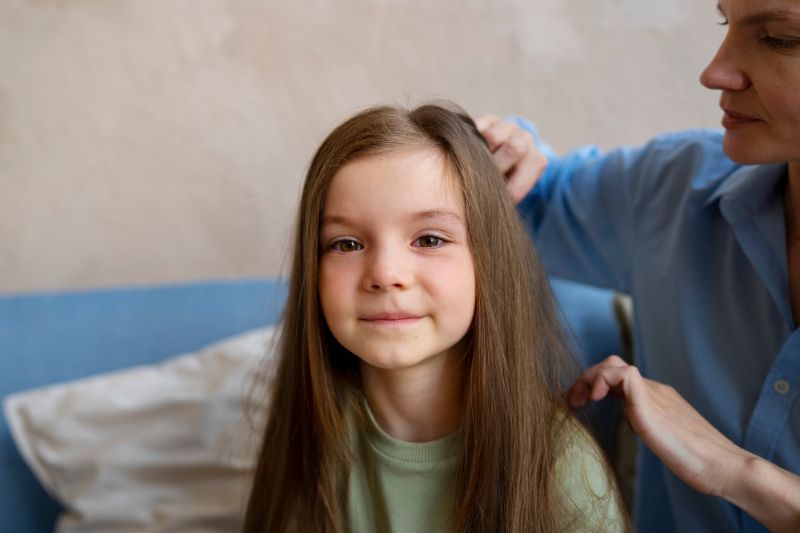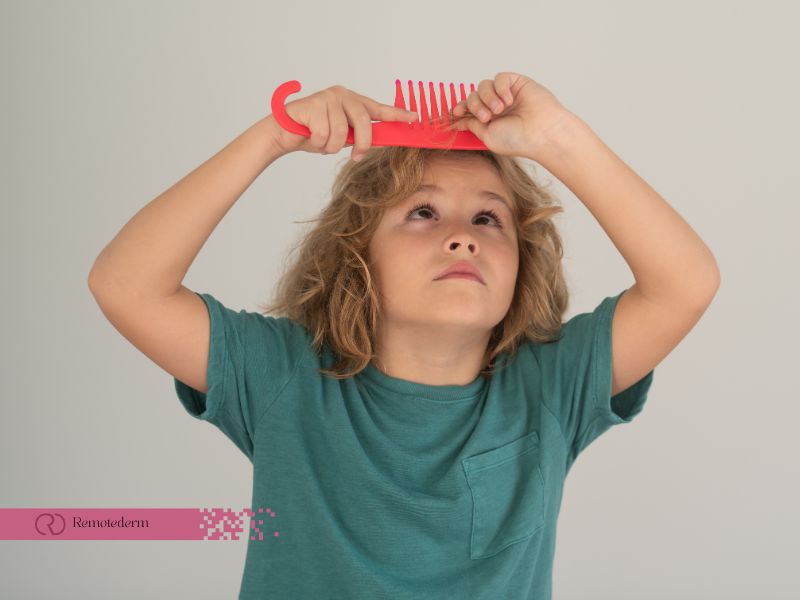In a world where appearance plays a significant role, hair loss can be a concerning issue, even in children. Parents often worry when they notice their child experiencing hair loss, seeking answers to understand the causes, potential remedies, and what’s considered normal. In this comprehensive guide, we’ll delve into the various aspects of child hair loss, addressing concerns and providing insights for a better understanding.
Is Hair Loss Normal for Children?
Hair loss is a common occurrence among adults, but it can also affect children. It’s important to note that some degree of hair shedding is normal for everyone, including children.
However, excessive hair loss in children may be a cause for concern and should be evaluated by a healthcare professional. There can be various reasons for hair loss in children, such as nutritional deficiencies, hormonal imbalances, or underlying medical conditions. Therefore, it is essential to seek medical advice to determine the underlying cause and appropriate treatment if necessary.
How Much Hair Loss Is Normal For A Child?
Children, like adults, typically lose about 50 to 100 hairs per day as part of the natural hair growth cycle. This shedding is usually not noticeable as new hair grows to replace the lost strands.

However, if a child is experiencing excessive hair loss or bald patches, it may be a cause for concern and should be evaluated by a healthcare professional. It is important to monitor the child’s hair loss patterns and seek medical attention if there are any significant changes or if the child is experiencing other symptoms along with the hair loss.
Causes of Hair Loss in Children
While some hair loss is normal, certain factors can lead to excessive or unusual hair loss in children. These factors can include:
- Nutritional Deficiencies
A balanced diet is crucial for healthy hair growth. Children with inadequate intake of essential nutrients like iron, zinc, and biotin may experience hair thinning.
- Medical Conditions
Certain medical conditions, such as alopecia areata, tinea capitis (ringworm), and trichotillomania (hair-pulling disorder), can lead to hair loss in children. These conditions need to be properly diagnosed and treated by a medical practitioner.
- Autoimmune Disorders
In some cases, the body’s immune system mistakenly attacks the hair follicles, leading to hair loss. Alopecia areata, an autoimmune disorder, can cause sudden and unpredictable hair loss in children.
- Hair Care Practices
Overly tight hairstyles, excessive use of heated styling tools, and harsh chemicals in hair products can contribute to hair breakage and loss in children.
- Emotional and Physical Stress
Stress, whether emotional or physical, can disrupt the hair growth cycle and lead to temporary hair loss.
Identifying the Signs of Hair Loss
Recognizing the signs of hair loss in children is essential for early intervention. Look out for:
- Thinning patches on the scalp
- Bald spots or circular areas of hair loss
- Excessive hair shedding on pillows, clothing, or in the shower
- Changes in hair texture or appearance
Managing Child Hair Loss
Hair loss in children can be distressing, but a comprehensive strategy involving professional consultation, treatment choices like medications and topical solutions, promoting healthy hair care practices, and providing emotional support can help address the issue effectively. Discover the various avenues for managing hair loss in children below:
Seeking Professional Help
If you’re worried that your child is losing more hair than usual, it’s important to seek advice from a paediatrician or dermatologist. These experts can identify the root cause of hair loss and suggest effective treatments.

For a convenient and effective option, you might want to explore online dermatologist consultation services specializing in hair loss. These online hair loss dermatologist services are accessible in various regions and often provide appointments within a short timeframe. This approach can help you bypass extended waiting periods and obtain the necessary assistance for any concerns regarding hair loss in your child.
Treatment Options
The approach to treating child hair loss depends on the underlying cause. Treatment options may include:
- Medications
For conditions like alopecia areata, doctors may prescribe corticosteroids or other medications to suppress the immune response and promote hair regrowth.
- Topical Treatments
Minoxidil, a topical solution, may be recommended to stimulate hair growth in certain cases of hair loss.
- Healthy Hair Practices
Teaching children proper hair care habits, such as using gentle shampoos, avoiding tight hairstyles, and limiting the use of heated styling tools, can help prevent further hair loss.
Emotional Support
Hair loss can impact a child’s self-esteem and emotional well-being. Providing emotional support, open communication, and reassurance can help children cope with the challenges of hair loss.
Preventing Child Hair Loss
In this section, we address methods to prevent child hair loss by focusing on nutritional considerations, which play a vital role in promoting healthy hair growth. Additionally, we discuss the importance of gentle hair care practices and effective stress management techniques to support a child’s overall hair health and reduce the risk of hair loss.
Nutritional Considerations
Ensuring your child receives a balanced diet rich in vitamins and minerals is crucial for maintaining healthy hair. Include foods like lean proteins, fruits, vegetables, and whole grains to promote optimal hair growth.
Gentle Hair Care
Teaching your child how to properly care for their hair can prevent damage and reduce the risk of hair loss. Encourage them to use mild shampoos, avoid tight hairstyles, and handle wet hair gently to minimize breakage.

Stress Management
Help your child manage stress through activities like outdoor play, hobbies, and spending quality time with family and friends. Adequate sleep and relaxation techniques can also contribute to overall well-being.
Final Thoughts:
In the journey to understand and address child hair loss, knowledge is power. As parents and caregivers, it’s natural to feel concerned when confronted with the possibility of hair loss in children. However, armed with the insights and guidance presented in this comprehensive guide, you are better equipped to navigate this challenge.
Remember, a certain amount of hair shedding is a natural part of the growth cycle, but excessive or sudden hair loss may signify an underlying issue. Seeking prompt medical attention is key to identifying the cause and pursuing appropriate treatment options. By fostering a healthy balance of nutritional intake, gentle hair care practices, and effective stress management techniques, you can contribute to your child’s overall well-being and promote the best conditions for healthy hair growth.
Supporting your child emotionally throughout this journey is equally essential. Embrace open conversations, offer reassurance, and help them understand that their worth goes far beyond their physical appearance. With patience, understanding, and the resources provided here, you can empower your child to face hair loss with resilience and confidence, ensuring they continue to shine in all aspects of their lives.
FAQs
- Can I use natural remedies to prevent child hair loss?
While some natural remedies may promote hair health, consult a healthcare professional before trying any treatments.
- Can a lack of sleep contribute to hair loss in children?
Poor sleep and high stress levels can disrupt the hair growth cycle, potentially leading to hair loss.
- Can children’s hair loss be a sign of an underlying health issue?
Yes, hair loss can sometimes be a symptom of an underlying medical condition, making professional evaluation crucial.
- How can I encourage my child to embrace their appearance despite hair loss?
Promote self-acceptance, emphasize their strengths, and help them understand that their worth is not solely tied to their physical appearance.

2 comments
My husband has hair loss. Are there any genetic factors that contribute to hair loss in children?
Yes, genetic factors can contribute to hair loss in children, especially if a child has a family history of hair loss or pattern baldness. Hair loss can be hereditary, and if a child’s parents or close relatives experience hair thinning or balding, there’s a possibility that the child may also experience similar patterns of hair loss as they grow older. However, it’s important to consult with a healthcare professional or dermatologist for a thorough evaluation and personalized advice based on the child’s specific situation.